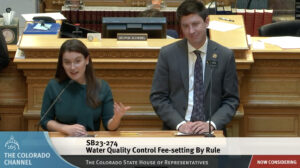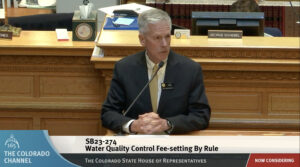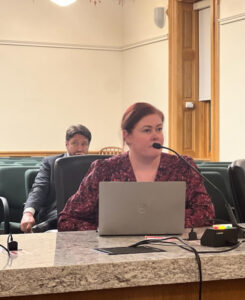A bill to let the Colorado Water Quality Control Commission raise clean- and drinking-water fees without legislative approval is on its way to Gov. Jared Polis, changed significantly from introduction but still of concern to business leaders worried about its potential for raising costs.
The water-quality control division within the Colorado Department of Public Health and Environment monitors water this is used and released by businesses ranging from oil-shale companies to manufacturing plants to fish hatcheries. It also oversees drinking-water supplies from utilities, local governments and other sources.
But it’s falling behind on its work, with 32% of drinking-water systems in Colorado not having received inspections in the three- to five-year period demanded by federal law, according to Trisha Oeth, CDPHE director of environmental health and protection. Also, Oeth told the House Energy and Environment Committee during an April 27 hearing, less than 75% of the water permits held by regulated entities in this state are current.

Colorado state Reps. Ruby Dickson and William Lindstedt explain to the House their bill to allow the Colorado Water Quality Control Commission to raise water-quality permitting fees.
Advocates of Senate Bill 274 argued that a big reason for the inspection backlog stems from the commission having to run a bill through the Legislature any time it wants to increase fees, which particularly has held up its ability to raise money during high-inflation periods like now. Clean-water fees have not gone up since 2017, and it’s been since 2007 that the division received a boost in its drinking-water fees, noted Rep. Ruby Dickson, a Greenwood Village Democrat co-sponsoring the bill.
What the bill would do
SB 274 would reform the commission to feature members with designated expertise who are not all a part of the same political party. Those members would, in turn, be able to raise water-quality fees for all companies, utilities and governments that need permits from the division as needed, although the bill would still require that fee hikes be included as part of annual budgets approved by the Legislature, which allows some scrutiny from elected officials.
Business and local-government groups said throughout the stake-holding process that they fear that removing legislative oversight of fee hikes could lead to economic uncertainty if the fees, some of which exceed $31,000, go up more frequently. Rep. Rick Taggart, R-Grand Junction, read through 11 fees that could be affected by the change, ranging from commercial- and industrial-sector permitting to public- and private-sector utility permitting to biosolids management programs, that could be affected.
“We weren’t elected to these positions to have that responsibility usurped,” Taggart said before unsuccessfully trying to add an amendment to SB 274 to give the Legislature final say over those fees. “We as a General Assembly have to take a much stronger position on 11 different fees that impact our constituents who are already paying very high tap fees for wastewater and water.”

Colorado state Rep. Rick Taggart discusses in the House his opposition to a bill regarding water-quality permitting fees.
Bill undergoes changes
But sponsoring Sen. Faith Winter, D-Westminster, made a handful of amendments that calmed many groups’ fears and helped them to drop their outright opposition to the bill.
Winter, for example, removed an immediate 8% across-the-board fee hike that was proposed in the bill, allowing instead for the commission to study and propose a schedule for fee hikes that will begin by 2026. Stakeholder processes are required by the CWQCC before any proposed increase in fees, the water-quality control division is required to offer reports on fee generation and spending to the Legislature annually and the Legislature retains in state law the ability to set fees by a bill if it wants to do so.
Meghan Dollar, senior vice president of governmental affairs for the Colorado Chamber of Commerce, asked the House committee to add two amendments — one to allow permit holders to secure pre-application meetings with the division to understand potential costs and the other to put a member of a private fee-paying company on the restructured CWQCC. While the bill would stock the nine-member commission with three representatives from the regulated community, chamber leaders are concerned that all three could come from public utilities rather than from private companies that must pay the fees.

Meghan Dollar, Colorado Chamber of Commerce senior vice president of governmental affairs, testifies to the House Energy and Environment Committee on Senate Bill 274.
However, co-sponsoring Rep. William Lindstedt, D-Broomfield, assured committee members that officials will emphasize that one of those seats should be a representative of commerce and industry. And he said that any requirement to grant pre-application meetings is unnecessary because the department now can grant those meetings when asked, although attorneys for permit holders say such meetings are rarer now than they used to be.
Water quality is key
While the bill ran into opposition from all Republicans in the House and two-thirds of the Republicans in the Senate, it got a boost from some business leaders who testified in its favor. Michael Gifford, president/CEO of the Associated General Contractors of Colorado, said the division needs to have the funding to do inspections because the alternatives — that a backlog of application reviews halts construction or that the U.S. Environmental Protection Agency steps in to try to take over the process — are highly undesirable.
“If a fee goes up, that’s not great,” Gifford said. “But it’s much more devastating to have a slowdown in work.”
It’s likely that Polis will sign the bill, particularly as leaders within CDPHE spearheaded the effort to bring about the changes. Dickson emphasized that the new fees would clear up the two-year backlog of inspections, and Winter said they will benefit all Coloradans who drink water.
“Water is essential to our quality of life, and its infrastructure must be maintained,” Winter told the Senate Finance Committee during an April 18 hearing. “And this is a clear step forward to do that more efficiently.”
